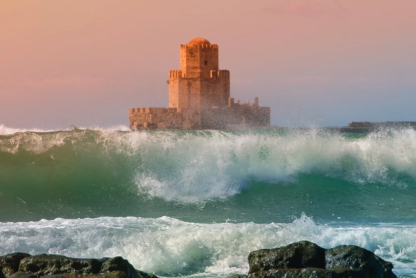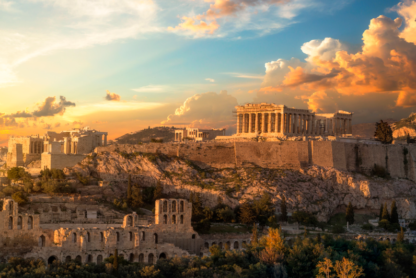
Greece, the cradle of Western civilization, is also the land of myths and legends that have captivated our imagination for millennia. From the epic tales of gods and heroes to the awe-inspiring landscapes that inspired them, Greece offers a journey through time where history and mythology intertwine. Here are ten of the most mythologically significant destinations in Greece, along with things to do, see, and nearby locations to enhance your experience.

1. Mount Olympus
Mount Olympus, the legendary home of the Greek gods, is Greece’s highest peak and a place of stunning natural beauty. Surrounded by lush forests and dramatic landscapes, the mountain is dotted with charming villages like Litochoro, a gateway to the hiking trails, and Dion, an ancient city rich in archaeological treasures. Each village offers a glimpse into traditional Greek life, with cozy tavernas, stone-built houses, and warm hospitality, making the region a perfect blend of myth and reality.
Things to Do:
- Hike to the summit for breathtaking views and to connect with the myths of the gods.
- Visit the Archaeological Museum of Dion to see artifacts related to ancient worship practices.
- Wander in Litochoro, enjoy the local food, visit the Olympus National Park Information Center and the maritime museum of the village and for extra natural beauty take a walk through the pine-covered Katounia park.
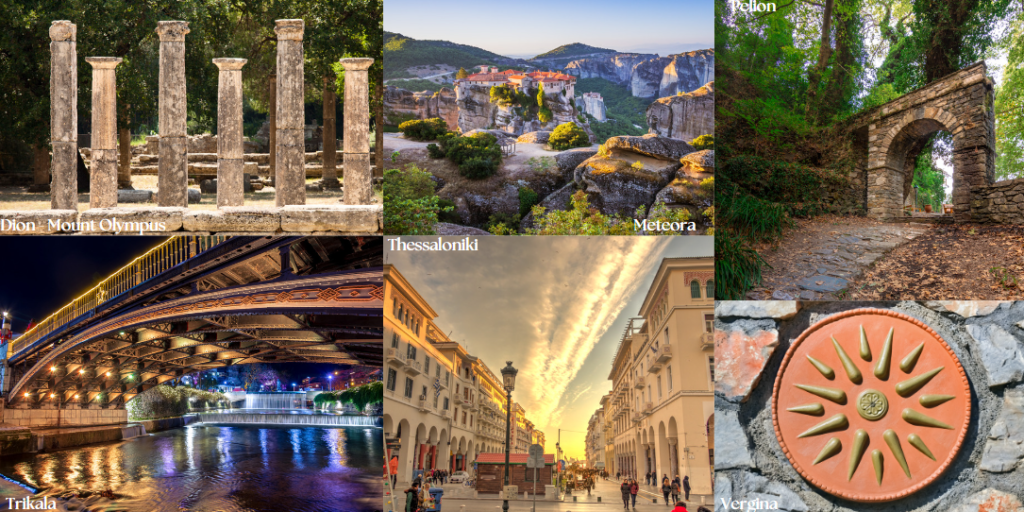
Combine With:
- Thessaloniki, just a couple of hours away, offers rich Byzantine history and vibrant culture. On the way enjoy a stop at Veroia and Vergina to learn more about the Great Alexander and admire the archaeological sites and the natural beauty of these locations.
- Pelion, approx. 170km away from Mount Olympus, this lush paradise offers amazing beaches, breathtaking views, delicious local gastronomy and Myths about the Nymphs and the Centaurus.
- Meteora, combine this mountain cultural and mythological trip with a visit to Meteora, the unique destination with the mystical rock formations with monasteries on top of them in the middle of Thessaly. On the way you could enjoy a stop at Trikala, a lively city with picturesque old neighborhoods and traditional tavernas.

2. Delphi
Delphi, once considered the center of the world in ancient Greek mythology, is a site of profound historical and spiritual significance. Nestled on the slopes of Mount Parnassus, this ancient sanctuary was home to the Oracle of Delphi, where the priestess Pythia delivered prophecies. Today, visitors can explore the Temple of Apollo, the ancient theater, and the Delphi Archaeological Museum, all while soaking in the breathtaking views of the surrounding valley. Delphi remains a captivating destination where history, mythology, and natural beauty converge.
Things to Do:
- Explore the Temple of Apollo and the ancient theater.
- Visit the Delphi Archaeological Museum to view the Charioteer of Delphi.
- Visit the hot springs of Thermopiles and enjoy a natural spa day
- Visit Livadia, this town boasts a rich historical heritage and offers a plethora of cultural, gastronomical, recreational and archaeological experiences to enjoy!
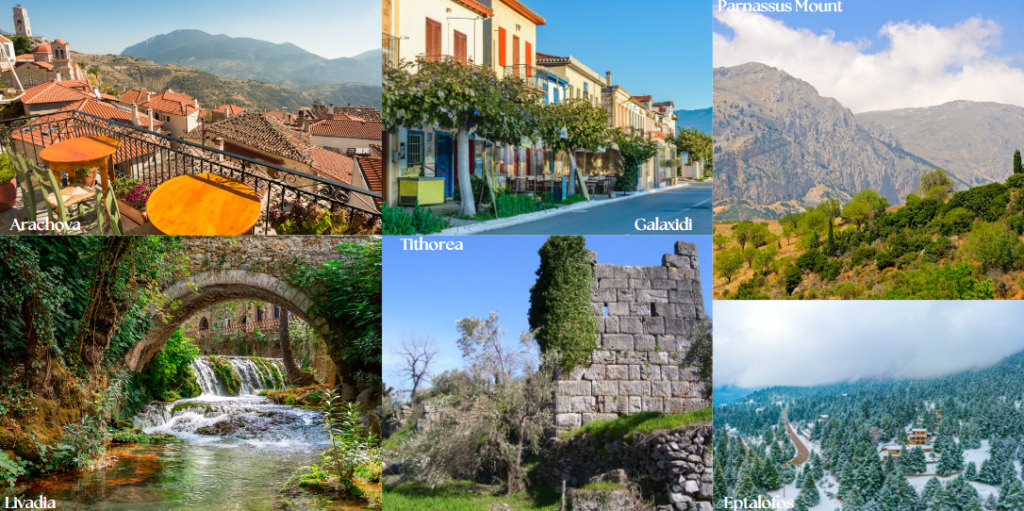
Combine With:
- Arachova, a nearby mountain village, perfect for experiencing local culture and cuisine. Especially during the winter and spring months, when Mount Parnassus is dresses in white, Athenians and other local ski enthusiasts visit Arachova on the weekends making it the winter Mykonos of Greece!
- Eptalofos, Polydrossos, Amfikleia & Tithorea are 4 villages close to Delphi worth combining your trip with. Each one offering different cultural, historical, mythological & natural elements, they are all picturesque and unique in their own way.
- Galaxidi, especially during the summer and fall go for a short escape to this waterfront picturesque village. Enjoy fresh fish, the local architecture and the beautiful nearby beaches!
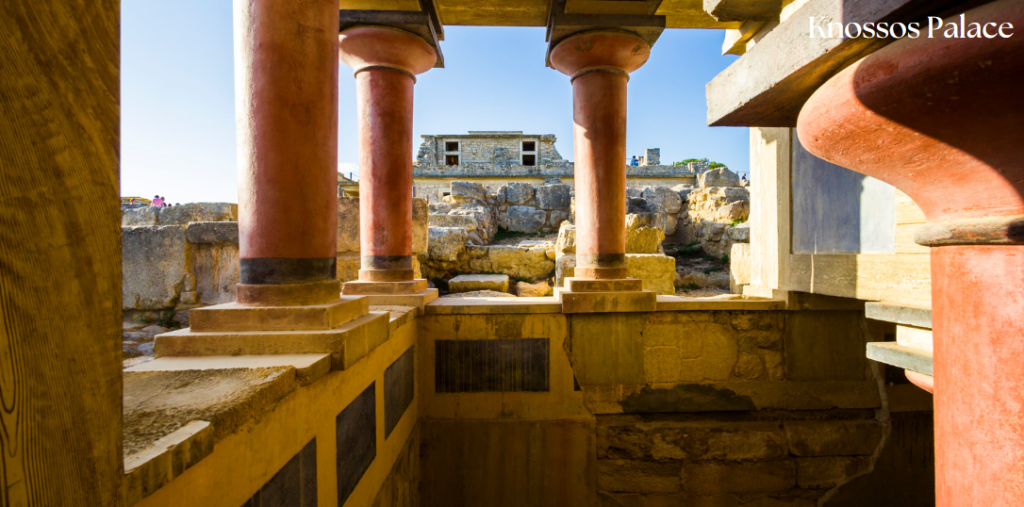
3. Crete – The Palace of Knossos
The Palace of Knossos, located on the island of Crete, in the Heraklion region, is steeped in Greek mythology and is famously linked to the legend of the Minotaur. According to myth, King Minos of Crete commissioned the labyrinth beneath the palace to imprison the Minotaur, a creature with the body of a man and the head of a bull. This labyrinth and the palace itself are central to the story of Theseus, who defeated the Minotaur with the help of Ariadne, Minos’ daughter. The ruins of Knossos today offer a glimpse into the Minoan civilization, blending historical intrigue with mythical lore.
Things to Do:
- Tour the Palace of Knossos, a breathtaking archaeological wonder.
- Explore the Heraklion Archaeological Museum, which houses Minoan artifacts.
- Enjoy the local gastronomy, have a food tour or a cooking class to experience both the cultural and historical heritage of Crete.

Combine With:
- Chania region. Visit the stunning beaches of Elafonissi and Balos for a mix of culture, natural beauty and relaxation.
- Kourlakiotiko gorge and Preveli forest & beach. Hike through the magical Kourlakiotiko gorge and end up at Preveli palm forest and beach.
- Rethymno region. Stay in one of the regions traditional boutique hotels and learn about local legends and significant historical moments.
- Elounda. Enjoy a luxury beach vacation in Lasithi region, explore Vai beach, Diktaion Andron cave and Spinalonga islet. Mingle with the hospitable locals and have the most memorable time in Crete.
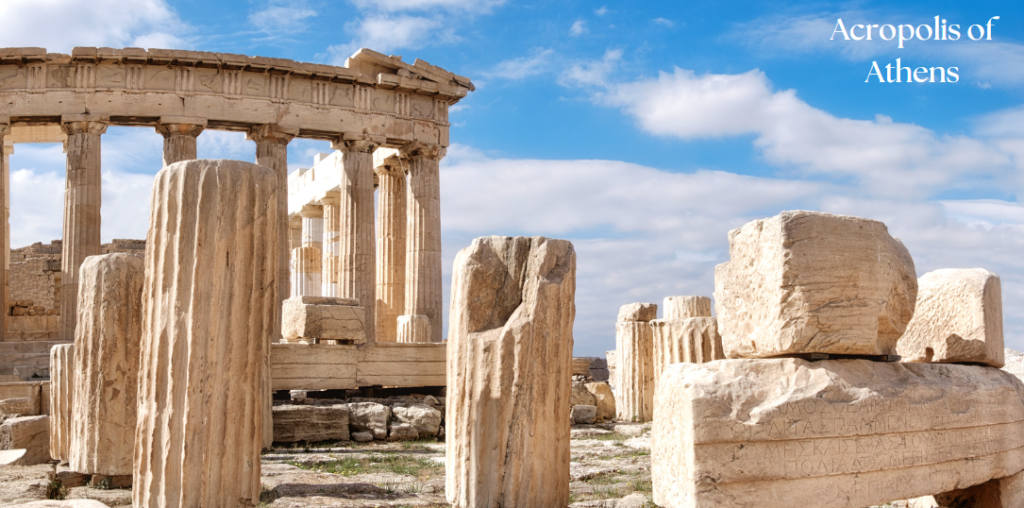
4. Athens – The Acropolis
The Acropolis of Athens holds immense mythological significance as the sacred site dedicated to Athena, the goddess of wisdom and war, who is also the city’s namesake. According to legend, the Acropolis was the site of the contest between Athena and Poseidon for the patronage of Athens. Athena’s gift of the olive tree, symbolizing peace and prosperity, won the favor of the citizens, and the Parthenon was later built in her honor. The Acropolis stands as a symbol of ancient Greek civilization, intertwining history, mythology, and religion in its majestic ruins.
Things to Do:
- Exlore the Acropolis archaeological site, the Panthenon, the Ancient Theatre and the Agora.
- Explore the Acropolis Museum for a deeper understanding of the Athenian history.
- Wander in the historical neighborhoods of Athens, Thisio, Plaka, Monastiraki and Keramikos, where you can find picturesque architecture, delicious food, small cafes, iconic shops and several urban hidden gems.
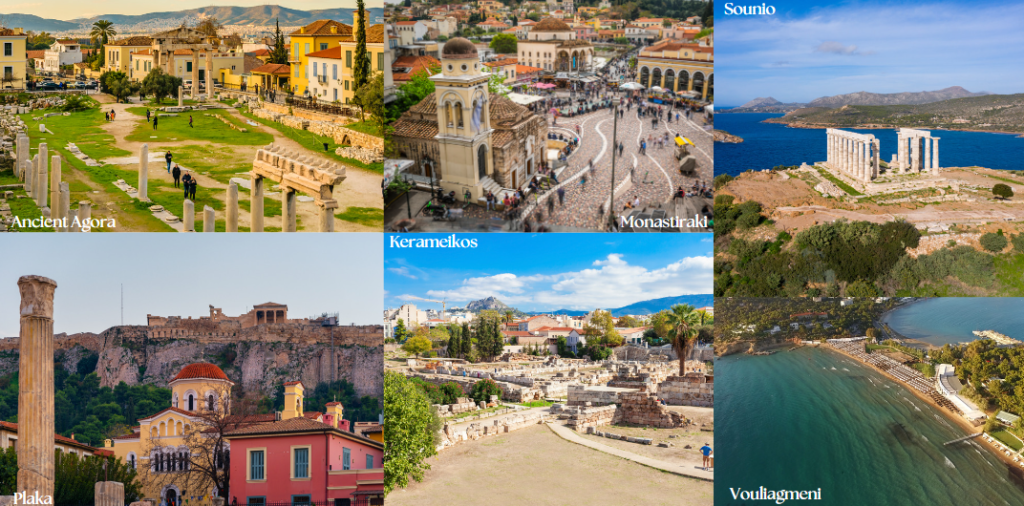
Combine With:
- Take a day trip to Sounion to see the Temple of Poseidon perched on a cliff over the Aegean Sea.
- Enjoy a day of beach relaxation at the Athenian Riviera, Glyfada, Vouliagmeni, Voula, Varkiza, Lagonissi, Anavissos.
- Have a shopping spree at Glyfada and Astir Marina of Vouliagmeni.
- Escape to the Saronic islands. Hydra, Aegina, Agkistri, Spetses and Poros are only a quick ferry ride away from Piraeus port. During the summer season there are also several day or multiday cruises to those islands!
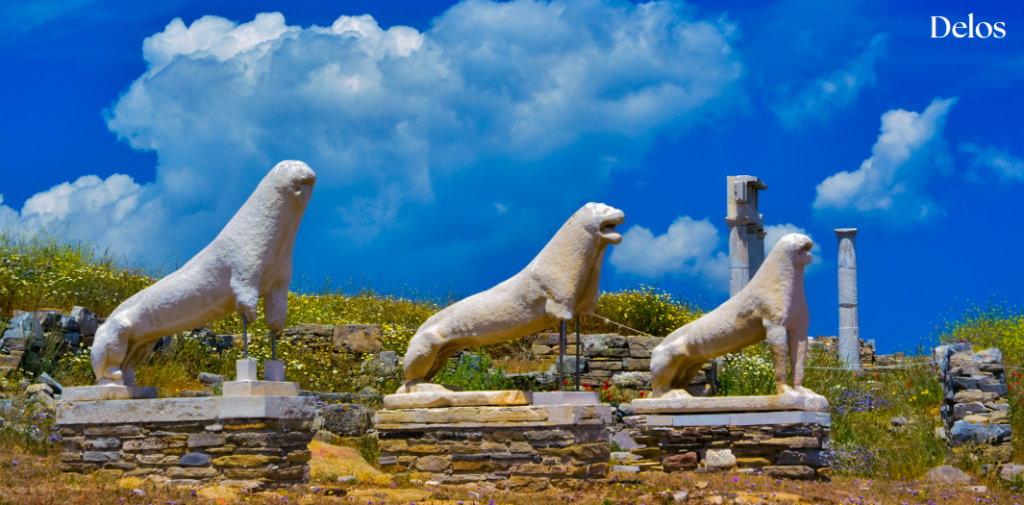
5. Delos
Delos, a small island in the Cyclades, next to Mykonos, is one of the most mythologically significant sites in Greece. According to Greek mythology, Delos was the birthplace of the twin gods Apollo, the god of light and music, and Artemis, the goddess of the hunt. The island was considered a sacred sanctuary, and it became a major religious center in the ancient world. Delos’ rich mythology and its role as a spiritual hub make it a key destination for understanding the religious and cultural history of ancient Greece.
Things to Do:
- Wander through the ancient ruins, including the Temple of Apollo and the Terrace of the Lions.
- Visit the Archaeological Museum of Delos for a glimpse into the island’s rich past.
- Enjoy a cruise to Delos, Rineia and Mykonos iconic beaches.
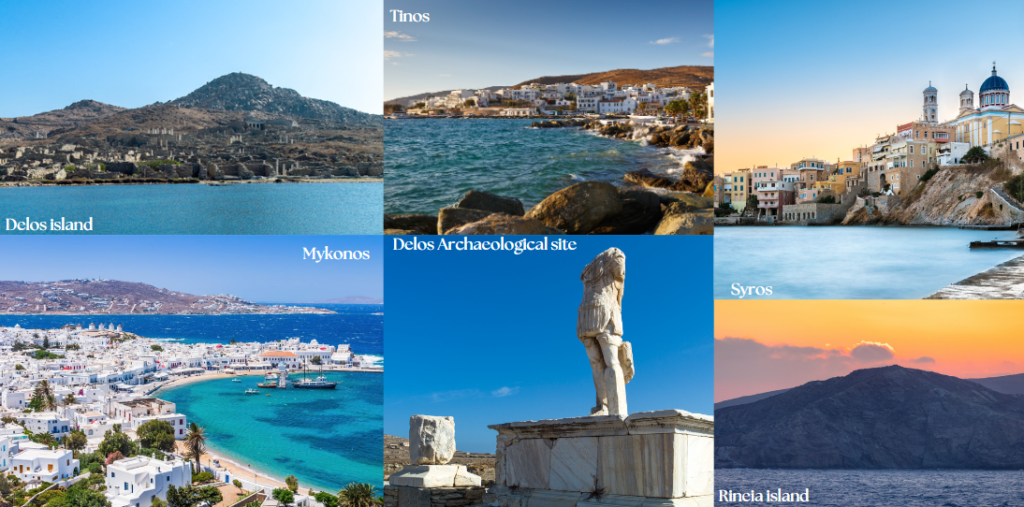
Combine With:
- Stay at nearby Mykonos for a blend of vibrant nightlife and serene beaches.
- Combine your trip with a stay in Tinos or Syros islands. Each one offering different back drops and Cycladic elements.
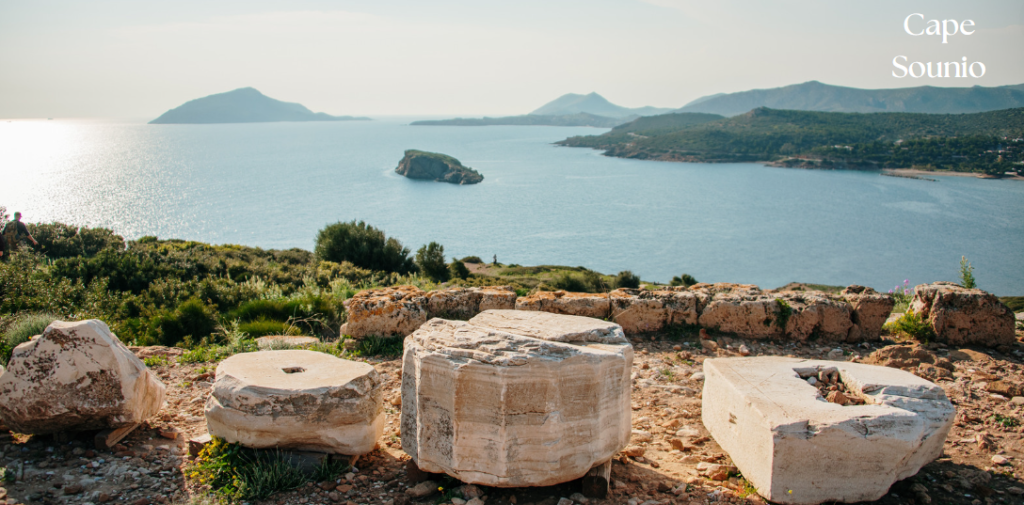
6. Cape Sounion
Cape Sounio, located at the southern tip of the Attica peninsula, holds significant mythological importance in Greek history. It is famously associated with the myth of King Aegeus, the father of Theseus. According to legend, up to Theseus return from Crete to Athens, his crew forgot to change the sails to white due to their distraught from the farewell to Ariadne, as a result Aegeus leapt to his death from the cliffs of Cape Sounio into the sea, mistakenly believing his son had perished. This event is said to have given the Aegean Sea its name. The majestic Temple of Poseidon at Cape Sounio, dedicated to the god of the sea, stands as a powerful symbol of ancient Greek worship and maritime significance.
Things to Do:
- Watch the sunset at the Temple of Poseidon, one of the most picturesque sights in Greece.
- Explore the surrounding coastline, dotted with beaches and small villages.
- Visit Lavrio for fresh sea food and familiarization with the local heritage.

Combine With:
- A visit to Athens, just an hour away, to delve into the heart of ancient Greek culture.
- A getaway to the Cycladic islands of Kythnos & Kea from Lavrio port.
- Enjoy the beached surrounding Cape Sounio.
- Enjoy a day cruise from Lavrio.
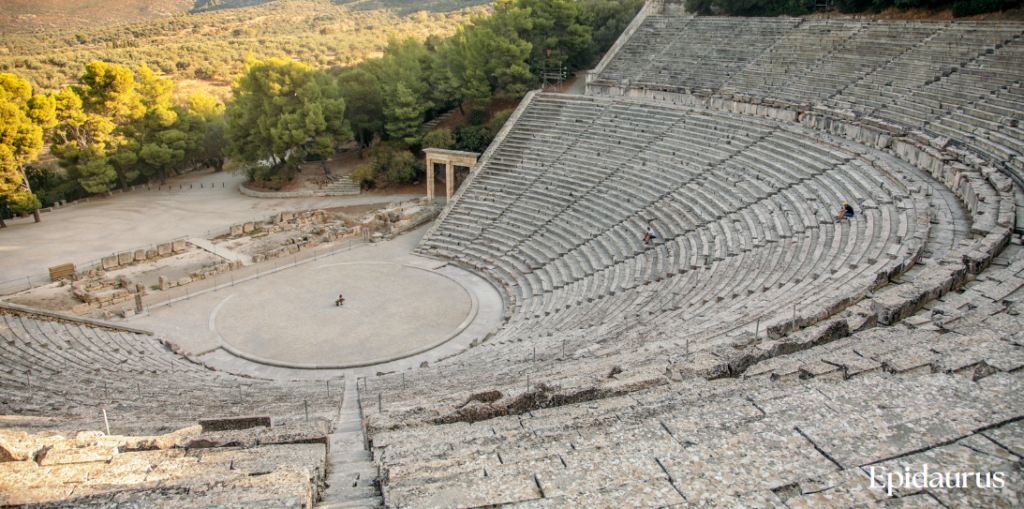
7. Epidaurus
Epidaurus, located in the Peloponnese, is a site of great mythological and historical significance in ancient Greece. It was considered the sacred sanctuary of Asclepius, the god of medicine and healing. According to myth, Asclepius was born in Epidaurus, and the site became a major center for healing, where people from all over the ancient world would come to seek cures for their ailments. The famous Theater of Epidaurus, renowned for its exceptional acoustics, was built as part of this sanctuary, reflecting the deep connection between healing, art, and spirituality in Greek culture.
Things to Do:
- Attend a performance in the ancient theater, renowned for its perfect acoustics.
- Visit the Sanctuary of Asclepius and the small museum nearby.

Combine With:
- Stay in the nearby town of Nafplio, with its charming old town and historic sites.
- Explore the Archaeological site of Mycenae.
- Enjoy a winetasting and a vineyard tour at Nemea. Don’t forget to visit Ancient Nemea and enjoy the local gastronomy.
- Endure in an escape to Porto Heli, enjoy the beautiful beaches and have a day trip to Spetses island.
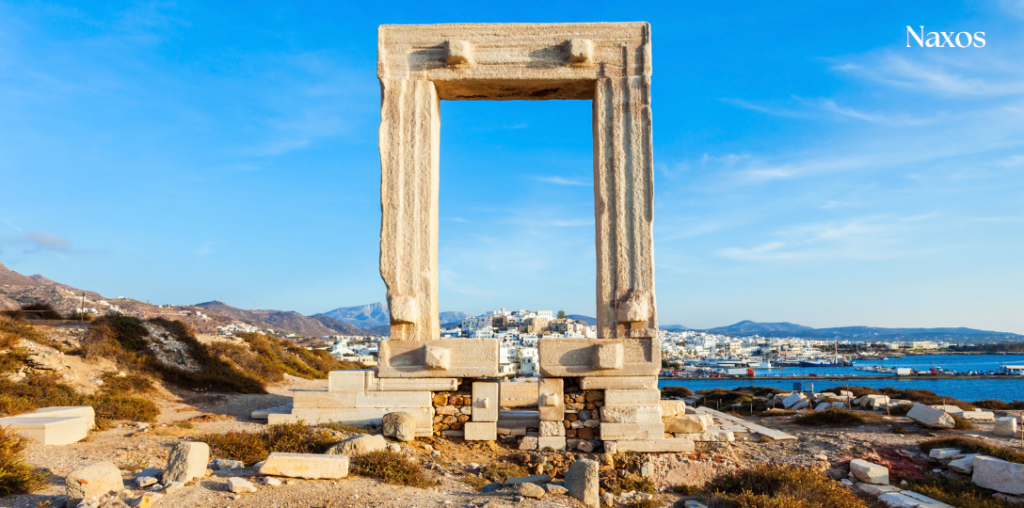
8. Naxos
Naxos, the largest of the Cycladic islands, holds a significant place in Greek mythology. It is famously associated with the god Dionysus, the god of wine and festivity, who is believed to have been born and raised on the island. According to myth, Naxos is also where Theseus abandoned Ariadne after she helped him defeat the Minotaur in Crete. Dionysus found Ariadne on the island, fell in love with her, and made her his wife. Naxos, therefore, symbolizes both divine celebration and the intertwining of human and godly destinies, making it a land rich in mythological history.
Things to Do:
- Visit Portara, a massive marble gateway that stands as a symbol of the island.
- Explore the Venetian Castle and the Archaeological Museum of Naxos.
- Wander in the pictureaque villages of Naxos. Discover Apeiranthos, Eggares, Melanes and Chalkio.
- Taste the Kitron, the local spirit made of the fruit and leaves of the citron tree, which is similar to the lemon tree but stronger and slightly different in taste.
- Experience water sports at the amazing Naxian beaches, from kite surfing to wake board and tubes, there is a fun activity for everyone.

Combine With:
- Island-hopping to nearby Paros or the less-visited Small Cyclades islands like Iraklia, Schoinnousa, Donnousa and Koufonisia.
- Amorgos. Naxos is a renown foodie destination, but did you know that its neighboring island, Amorgos is also known for its delicious local produce and recipes?
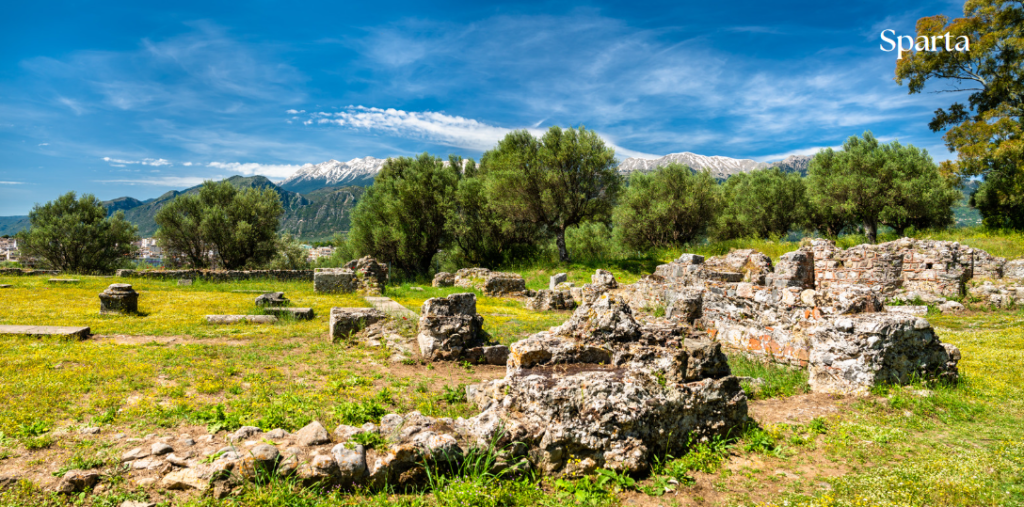
9. Sparta – The Sanctuary of Artemis Orthia
The Sanctuary of Artemis Orthia in Sparta holds profound mythological significance as a key religious site dedicated to Artemis, the goddess of the hunt, wilderness, and childbirth. In ancient Sparta, Artemis Orthia was particularly revered for her role in protecting and nurturing Spartan youth. The sanctuary was associated with rites of passage and rites of endurance, reflecting the city’s warrior culture. Annual rituals often involved dramatic ceremonies and rites of passage for Spartan boys, emphasizing their transition into adulthood and their readiness for military life. This sacred site thus embodies the integration of religious devotion with Spartan ideals of strength and resilience.
Things to Do:
- Visit the Acropolis and the Archaeological Museum of Sparta to learn about the city’s history.
- Explore the ruins of the ancient city, including the sanctuary of Artemis Orthia.
- Visit the olive oil museum of Sparta.
- Discover Taygetus Mount, enjoy a hike to the top.
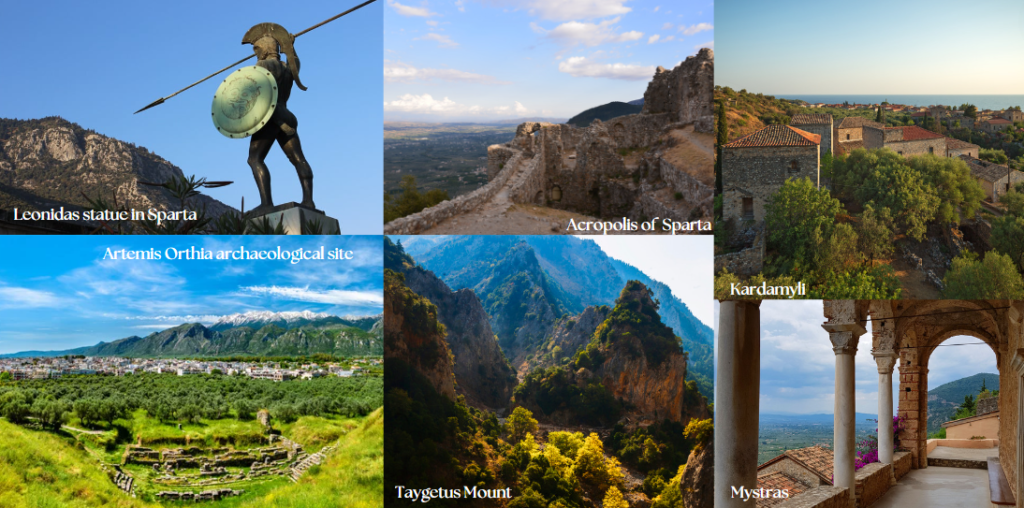
Combine With:
- A trip to Mystras, a nearby Byzantine town known for its well-preserved ruins. Explore the UNESCO World heritage site of Mystras with is lush forest and beautiful ruins.
- Stay in Kardamyli, a wonderful water front town in West – Mani with picturesque buildings and lush backdrop.
- Have a Wellness Holistic Experience in Euphoria Retreat in Mystras. This resort is one of the top tier wellness establishments in Europe!

10. Thebes
Thebes, a city in central Greece, is steeped in rich mythological history. According to legend, it was founded by Cadmus, a Phoenician prince, who sowed dragon’s teeth into the ground to produce the fierce Sparti warriors who helped him establish the city. Thebes is also famously linked to the tragic tales of Oedipus, who unknowingly fulfilled a prophecy by killing his father and marrying his mother, leading to a series of calamities. The city’s mythological significance extends to its association with Dionysus, the god of wine and revelry, who was worshipped there, and the hero Heracles, who performed several of his legendary labors in the region. Thebes thus represents a pivotal site in Greek mythology, embodying themes of prophecy, fate, and divine influence.
Things to Do:
- Visit the Archaeological Museum of Thebes, which houses artifacts from the city’s illustrious past.
- Explore the ruins of the ancient city, including the Cadmea, the citadel of Thebes.
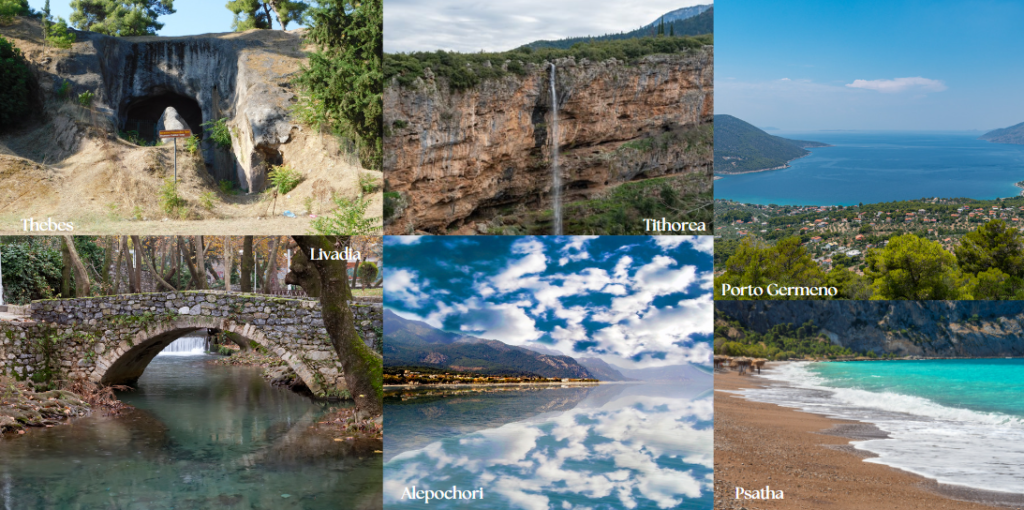
Combine With:
- A visit to the nearby town of Livadia, with its scenic landscape and historic significance.
- A beach exploration escape at Porto Germeno, Psatha, Alepochori and the other neighboring waterfront towns.
- A home stay at Tithorea. Cook with the locals, hike on the mountain trails and discover local legends and hidden mountain gems.
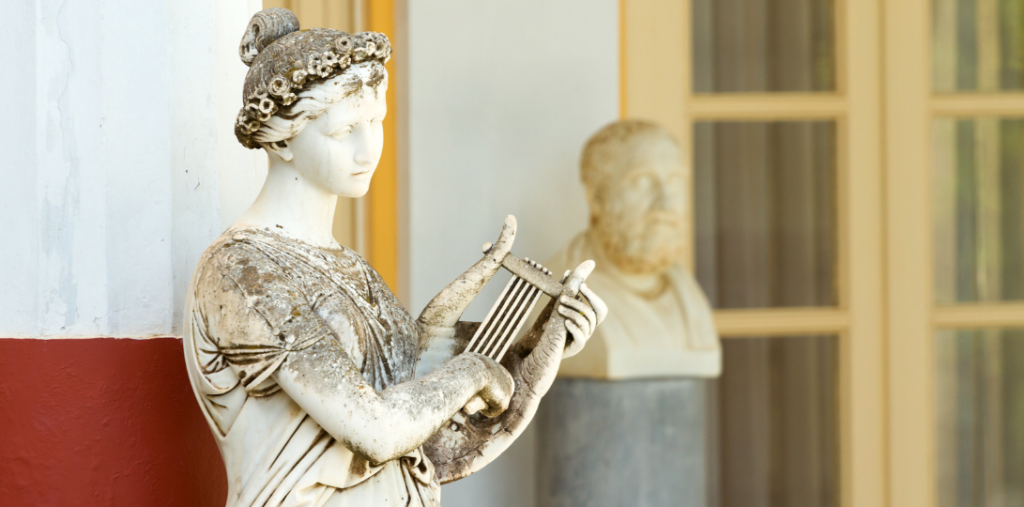
Conclusion
Greece’s mythological sites offer more than just a glimpse into ancient tales; they provide a deep connection to the country’s rich cultural heritage. Combine your visit with nearby attractions to fully immerse yourself in the magic and history of Greece. Whether you’re tracing the steps of heroes or standing in the places where gods once roamed, these destinations offer a unique and unforgettable experience.
*For an opulent experience in Greece, we invite you to explore our agency’s website. Allow us to curate the perfect journey tailored to your unique preferences and desires.








